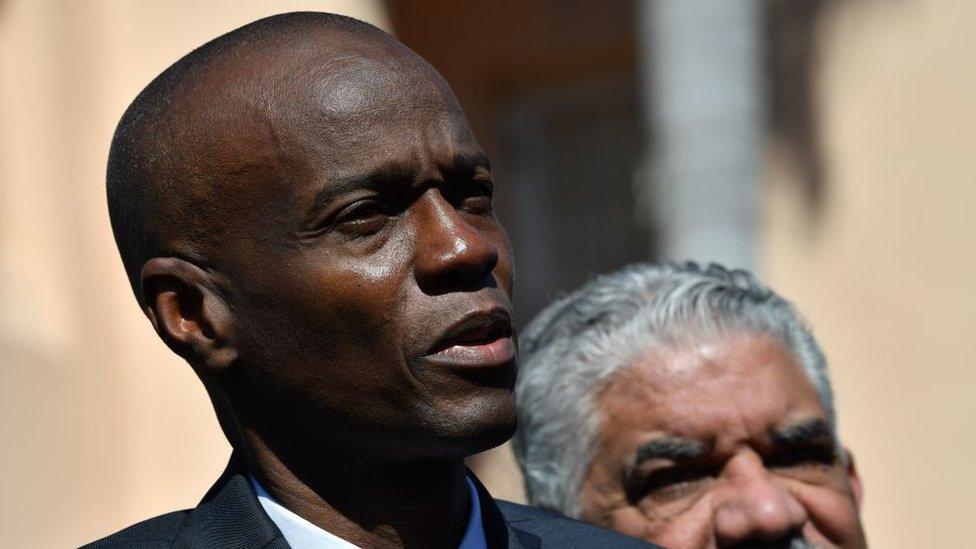Martine Moïse: Wife of Haiti's murdered president charged over his killing
- Published
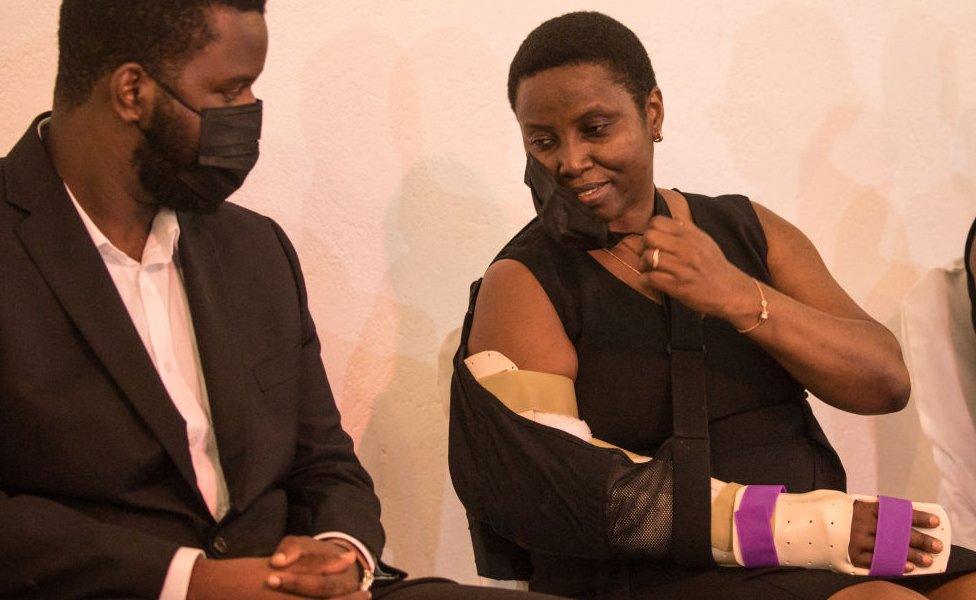
Martine Moïse (speaking to her son) was injured in the attack in which her husband was killed
A judge in Haiti has charged the widow of murdered President Jovenel Moïse in connection with the assassination of the former leader on 7 July 2021.
Martine Moïse, who was injured in the attack in which her husband was killed, is one of dozens of people charged following a two-year investigation.
According to a legal document leaked by a Haitian news site, she is accused of "complicity and criminal association".
Neither she nor her lawyer have so far commented on the specific charges.
Ms Moïse has, however, used social media in recent days to denounce "unjust arrests" and what she said was a "never-ending persecution". It is not known where she currently lives.
Haitian media have lamented the fact that while the lengthy legal document charges 51 people, it fails to identify who ordered and financed President Moïse's assassination.
The 53-year-old was shot dead on 7 July 2021 at his private residence on the outskirts of the capital, Port-au-Prince by a group of mainly Colombian mercenaries.
The latest charges became public on Monday when Haitian news site Ayibo Post leaked the indictment. They have been brought by Walther Wesser Voltaire, the fifth judge to head the murder inquiry.
In the 122-page legal document, external, he lays out the accusations against Martine Moïse and 50 other suspects.
He argues that the statements Ms Moïse gave in the wake of her husband's murder were "so tainted by contradictions that they leave something to be desired and discredit her".
As evidence against Ms Moïse, the document cites a statement given by Lyonel Valbrun, who was the secretary general at Haiti's National Palace at the time of President Moïse's murder.
Mr Valbrun alleges that Ms Moïse came to Haiti's National Palace - the official residence of the president - two days before the assassination.
According to Mr Valbrun, Ms Moïse spent five hours removing "a bunch of things" from the palace. It is not clear what objects she allegedly removed but the document implies the first lady's actions were not guided "by intuition" or "chance", but that she had prior knowledge of the events to come.
Mr Valbrun also alleges that on that same day, the first lady called him and told him that "Jovenel [Moïse] has done nothing for us" as president.
The indictment also quotes another suspect, former Haitian Justice Ministry official Joseph Felix Badio, who accuses Martine Moïse of plotting to oust her husband from power.
According to Mr Badio, the first lady conspired with the then-prime minister, Claude Joseph, to remove Mr Moïse from the presidency.
The plan, Mr Badio alleges, was for Claude Joseph to lead the country until elections were held, in which Martine Moïse would run for president.
Claude Joseph has also been charged with conspiracy and criminal association.
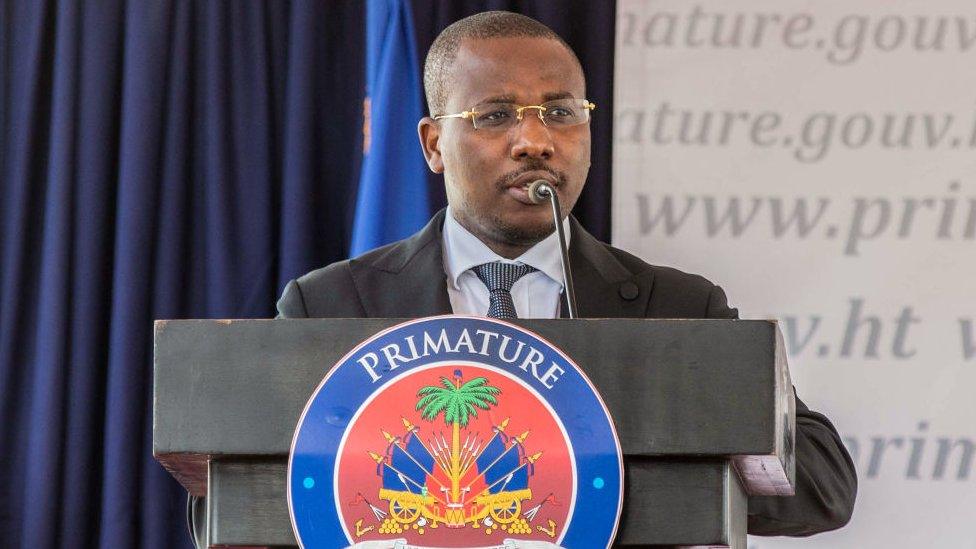
Claude Joseph was still prime minister when Mr Moïse was murdered, but he was soon replaced by Mr Henry
In a statement to the Miami Herald newspaper, Mr Joseph said he and the former first lady were being targeted by the current prime minister of Haiti, Ariel Henry.
Mr Joseph argues that Mr Henry was "the main beneficiary" of President Moïse's murder. Mr Henry was sworn into office two weeks after Mr Moïse's assassination and has been in power ever since.
Calls for his resignation have mounted in recent weeks, with many Haitians saying he has failed to deliver on his promise to hold long-delayed elections.
Mr Henry argues that elections cannot be held while the country is wracked by gang violence, which has spiralled out of control since President Moïse's assassination.
Mr Claude accuses Mr Henry of "weaponising the Haitian justice system, prosecuting political opponents like me".
"They failed to kill me and Martine Moïse on July 7th 2021, now they are using the Haitian justice system to advance their Machiavellian agenda," he writes.
Mr Henry is not on the list of those indicted by Judge Walther Wesser Voltaire, even though phone records reportedly showed he had received numerous phone calls from one of the suspects in the hours after the assassination.
The suspect who allegedly called Mr Henry is Joseph Felix Badio, the same man who is now quoted as accusing Martine Moïse of conspiring to topple her husband.
Mr Henry has always maintained that he does not recall receiving a phone call from Mr Badio on the night of the murder. But his sacking of the prosecutor who had sought to question him over the phone calls drew criticism and further delayed the investigation.
He has also dismissed allegations he was in any way linked to Mr Moïse's murder as "fake news".
Haitian authorities are not the only ones investigating Mr Moïse's assassination. Four people have also been sentenced to life in prison in the US, where part of the plot to topple President Moïse was hatched.
Related topics
- Published10 February 2024
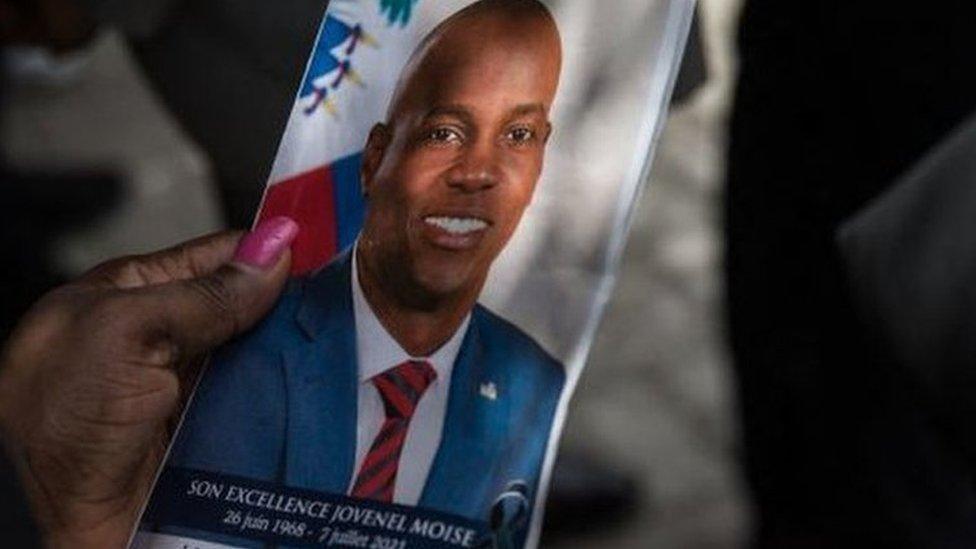
- Published8 February 2024
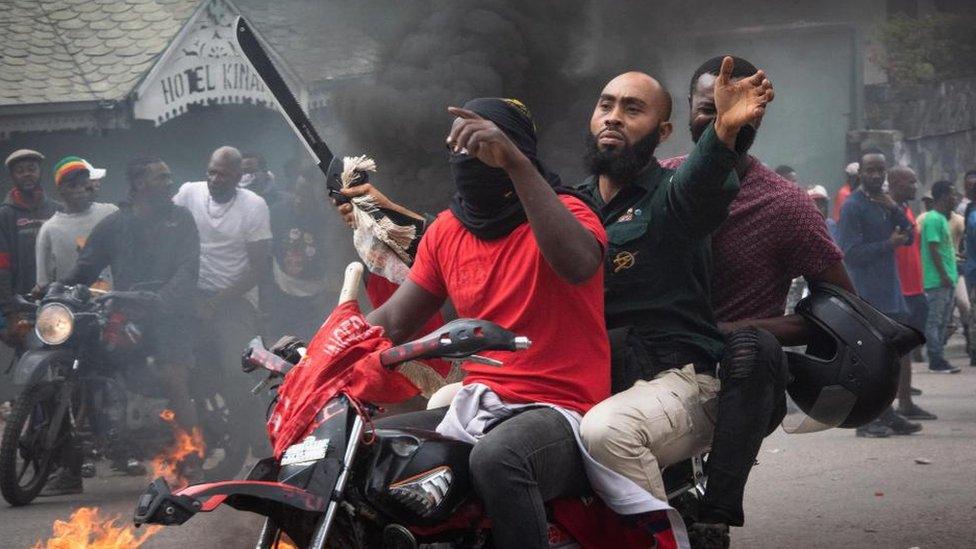
- Published20 October 2023
